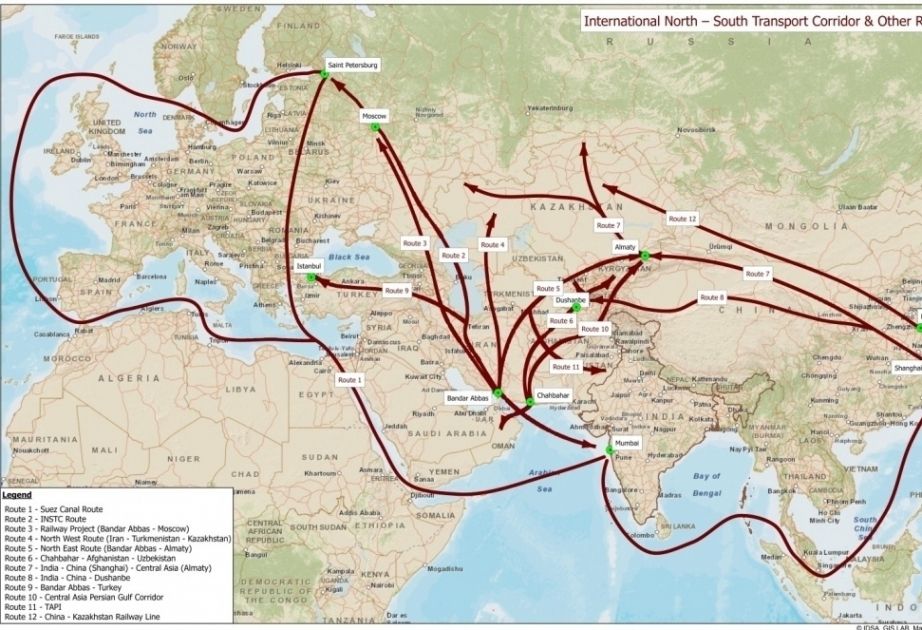WNAM REPORT: In recent years, Azerbaijan has advanced numerous large-scale infrastructure projects within the transport sector, complementing developments across various other sectors. The optimization of the country’s transit potential is a cornerstone of President Ilham Aliyev’s economic diversification strategy. The enhancement of international and regional transport corridors has notably improved national economic efficiency. Concurrently, collaborative initiatives in transport, infrastructure, and logistics are significantly broadening the state’s economic prospects and bolstering its strategic importance.
Service infrastructures across all areas of the transport sector are being modernized, projects related to the reconstruction of road infrastructure are being carried out, and numerous road crossings, bridges, tunnels, and pedestrian underpasses and overpasses are being built. A massive infrastructure project is being realized in the direction of implementing the International North-South Transport Corridor.
On August 19, Azerbaijani President Ilham Aliyev stated in a press release with his Russian counterpart Vladimir Putin that the “North-South” project holds exceptional significance in the interstate relations between Baku and Moscow.
President Aliyev emphasized that they discussed issues related to regional transport corridors and transport routes in detail, which are also of exceptional importance for interstate relations:
“I must say that both the railway and road segments of the ‘North-South’ corridor on Azerbaijan’s territory have been fully realized and are functioning successfully. At present, we are working on modernizing the railway section of this corridor to increase its throughput capacity. We are talking about the possibility of transporting 15 million tons or more of cargo per year.”
So, what is the North-South Corridor?
The International North-South Transport Corridor (INSTC) is primarily designed for transporting cargo from India and the Persian Gulf region to Russia, Western Europe, the Baltic States, and Scandinavian countries. The main advantage of the North-South Transit Corridor compared to other routes is that the transit distance and time are reduced by two to three times. While maritime transport through the Persian Gulf, the Indian Ocean, the Suez Canal, the Mediterranean Sea, and the Baltic Sea to Helsinki takes 45-60 days, the North-South Transit Corridor reduces this period to 20-25 days.
Within the framework of the North-South International Transport Corridor, work is being done to connect the railways of Azerbaijan and Iran. The railway from Azerbaijan’s Astara station to Iran’s Astara city has already been constructed. In the next phase, the construction of the missing 167 km-long Astara-Rasht railway will be realized to fully connect the railways of Iran and Azerbaijan. Once all the work is completed, the railways of Scandinavian countries, Russia, Azerbaijan, and Iran will be united in a single network, forming a continuous railway from the North to the Persian Gulf.
The agreement on the creation of the North-South International Transport Corridor was signed between the governments of Russia, Iran, and India on September 12, 2000. The Republic of Azerbaijan joined this agreement based on the Law dated September 20, 2005.
Russian President Vladimir Putin, during a meeting with the heads of global news agencies, expressed confidence that the North-South Transport Corridor could become a highly demanded international corridor. He also noted that cargo would be sent from Russia—through the port of Saint Petersburg—to Azerbaijan and then to Iran and the Persian Gulf. The Russian leader further added that this route is about 10 days faster than the Suez Canal route and that the project’s profitability would attract attention.
President Putin said: “We are working on both sides. I know that President Aliyev supports this project. We have discussed this issue with him several times. The Iranian leadership also supports this project. Because this corridor will be very profitable, foreign investors, including non-regional but nearby countries and sovereign Arab funds, are also interested in this project. It is clear because sovereign funds always look for reliable investment areas. This project is one of the reliable investments because there is a guarantee and assurance of its profitability.”
Putin emphasized that further studies are needed regarding the North-South Corridor, including discussions on which areas of Azerbaijan the transport-logistics system will cover, how it will be financed, how it will be integrated with westward routes from Azerbaijan, and how the diversified sections of the route crossing Iran will be constructed.
It should be noted that the countries that signed the agreement for creating this transport corridor have set a significant task of transporting 30 million tons of transit and bilateral cargo by this infrastructure by 2030. A Joint Working Group has been established to address issues related to facilitating transport and transit operations and procedures through their territories in the context of the corridor’s development.
In conclusion, Azerbaijan’s strategic investment in large-scale transport infrastructure projects underscores its commitment to leveraging transit potential as a key component of its economic diversification efforts. By advancing international and regional transport corridors and fostering collaborative projects in transport, infrastructure, and logistics, Azerbaijan is not only enhancing its economic efficiency but also significantly expanding its global economic opportunities and reinforcing its strategic importance on the world stage.


